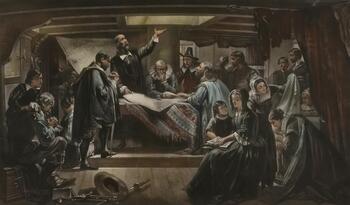
What are political norms so badly eroded? Why are fair play and following the rules in decline in our society? How do we explain the decline in trust in institutions and the rise of conspiracy theories? What accounts for the electoral success of a charismatic populist like Trump?
Believe it not, one man, sociologist E. Digby Baltzell, had a lot of very insightful things to say on all of these topics. To some extent he even predicted them decades ago. Baltzell, the person who popularized the term “WASP” for White, Anglo-Saxon Protestant, was America’s foremost scholar of the upper class. He saw after World War II that the Protestant establishment was in trouble, in part because of WASP failures to assimilate non-Protestants and to take up leadership roles in society.
But unlike most people, Baltzell thought America needed an upper-class establishment, and that its loss would create many of the negative social dynamics we are experiencing right now. While we should not view his takes overly determinative, he has fascinating and seldom considered perspectives on the problems challenging our country today.
I wrote a major feature article at American Affairs that is an introduction and retrospective on Baltzell’s work. I strongly encourage you to read it. Not only it is key in understanding social changes in America since the 1960s, it covers a lot of material very few of you have probably encountered before.
One of Baltzell’s most valuable contributions is in how he helps us to distinguish between the elite, the wealthy, and the upper class. He also helps us distinguish between a well functioning (aristocratic) and poorly functioning (caste) upper class, and between a well-structured (establishment) and poorly structured (declassed) elite. Just having these categories and distinctions in mind is very valuable.
As a descendent of Catholic peasant stock on both sides of my family, I would not have been invited into the WASP clubs, but I found researching this fascinating nevertheless. I’ll be writing more on this topic future newsletters, but here’s an extended excerpt from my piece:
An upper-class establishment was necessary, in Baltzell’s view, to a healthy and functional society. Without it, a democracy would devolve into bureaucratic despotism, corporate feudalism, charismatic Caesarism, or some other undesirable state as a result of runaway social atomization. This upper-class role came from its status and wealth, to be sure. But it also arose, crucially, from the fact that—in contrast to economically or functionally defined groupings, such as the working class or the elite—it was an actual social community. As Balztell’s student and collaborator Howard Schneiderman summarized it, the upper class maintained “a sense of gemeinschaft-like solidarity.” This social solidarity is what made it a counterweight to social atomization and an independent power base that could act as a check against excesses in business, government, or a charismatic populist leader....
In their day, the WASPs were a culture-setting class for America, meaning that many of their moral and behavioral codes were normative, or at least aspirational, for all classes. In addition, because WASPs themselves held a substantial number of key elite positions in the era of the Protestant establishment, this allowed them to enforce les règles du jeu and to ensure that not just the letter of the law but also the unwritten rules and norms were followed by all. As Schneiderman put it,
A moral force within the putatively amoral world of politics and power elites, an establishment of leaders drawn from upper class families, is the final protector of freedom in modern democratic societies. Such an establishment of political, business, cultural, religious, and educational leaders succeeds in its moral function when it sets, follows, and enforces rules of fair play in contests of power and opinion.... Hegemonic establishments give coherence to the social spheres of greatest contest. They don’t eliminate conflict, but prevent it from ripping society apart.... The genius of an establishment lies in its capacity to put moral brakes on power by applying an upper class code of conduct and responsibility to it.
This piece first appeared at Heartland Intelligence. Click through to read the rest.
Aaron M. Renn is an opinion-leading urban analyst, consultant, speaker and writer on a mission to help America’s cities and people thrive and find real success in the 21st century. He focuses on urban, economic development and infrastructure policy in the greater American Midwest. He also regularly contributes to and is cited by national and global media outlets, and his work has appeared in many publications, including the The Guardian, The New York Times and The Washington Post.
Photo: Signing of the Compact in the Cabin of the Mayflower, lithograph Smithsonian American Art Museum, under CC 0 License.












